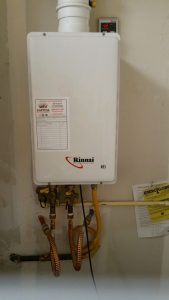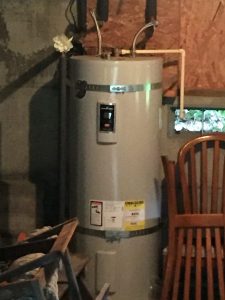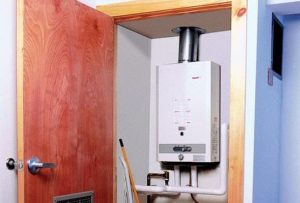If you’ve engaged in a home improvement project recently, you’ve probably noted the wide variety of new technologies and innovations available for your home. For many, the choices are dizzying, especially when upgrading appliances and systems in your home and people are often left wondering what is the right choice. One of these new choices is a tankless hot water heater. While many have heard of them, or may even have seen them in action, it’s hard to decipher the benefits versus the costs and know if a tankless hot water heater is right for you.
According to Energy.gov, hot water heating represents an average of 20 percent of your energy bill. With this knowledge, it’s essential to choose a system that balances performance and efficiency.

Sometimes, it’s good to turn to the experts when making these decisions. Dwayne Boggs, owner of Boggs Inspection Service, has been in the inspecting business for more than a decade and has seen just about every type of system – good and bad – that a home or business has to offer. For many, the choice of tankless or a traditional tank system is a matter of personal preference, however, there are some important aspects to weigh before making the final purchase. Cost may top your list of concerns, but household water needs, system longevity, energy efficiency and home size are all important.
Dwayne shares his knowledge below with four things to consider when deciding on a tankless hot water heater.
- Energy Efficiency
Saving money and reducing your energy usage are important to most people and going tankless can certainly accomplish that goal. Energy.gov states that for households using “41 gallons or less of hot water daily, tankless water heaters can be 24% to 34% more energy efficient than conventional storage tank water heaters. They can be 8% to 14% more energy efficient for homes that use a lot of hot water – around 86 gallons per day.”
This sounds like a no brainer, but be sure to read the fine print. These stats are for electric models only. A gas-powered model includes an always-on pilot light causing those numbers go down significantly. Do your homework before basing your decision on energy savings alone.
-

It’s important to weigh all factors when choosing to upgrade to a tankless hot water heater or simply replace your storage tank heater with a new one. Home Size and Water Usage
Home and business owners need to take a careful look at usage habits before converting to a tankless hot water heater. Your capacity needs will be dictated by both the size of your home and the number of demands placed upon your system. Do you have four kids? Do you have a large home? How much laundry do you do each week? When selecting a hot water tank, either conventional or tankless, you must consider your capacity needs first and foremost.
In a tank heater, the “first hour rating” or FHR shows how many gallons of hot water your system can deliver in its first hour of use, which is critical information if you have several people taking showers at the same time each morning. A different rating is used on tankless hot water heaters – a “gallons-per-minute” rating or GPM. This likewise indicates how much water you’ll get in a set time period.
Assess your home’s needs. If you have high-demand periods (say mornings before work and school), you may need two tankless units to supply two areas of the home (kitchen/laundry and bedrooms) or a larger capacity (over 55 gallons) tank hot water heater. “Ensuring your hot water heater is correctly sized for your structure and usage needs is the most important thing when making a decision on hot water heater type,” explains Dwayne.
Dwayne also suggests using a circulation pump to ensure hot water is delivered quickly to each faucet, reducing water waste with running taps.
- Cost and Longevity
It’s true that tankless hot water heaters cost more than traditional hot water heaters. No one will dispute that fact. But, with an estimated 20-year average lifespan versus 10 – 15 for tank styles, they can pay you back over time. The energy savings accrued from a tankless often covers the upfront costs and much more during the system’s lifespan. However, household usage needs may mean you install two tankless units, changing that cost equation. Be sure to compare all aspects of cost, including maintenance and service of a tankless system, before making your final choice.
- Electric, Natural Gas or Propane?

All hot water heaters, regardless of configuration, require a power source to heat water. Natural gas, propane or electricity are the typical choices. In a traditional tank system, all 55+ gallons of water are heated to a set temperature, typically around 120 degrees Fahrenheit and held there, ready for use. In contrast, a tankless system pulls cold water across heating element coils to heat it only when it is needed.
Electric, gas and propane models are available for both systems, but most industry professionals suggest gas or propane for tankless systems. Why? “Most electric tankless hot water heaters will require an upgrade to your electric panel,” shares Dwayne, “which can get pretty expensive, pretty fast.”
If you already have a propane or natural gas source for your current hot water heater, you are a step ahead. However, the location of your system may need to be moved, venting added and piping upgraded to make a tankless system viable. These added costs and potential construction needs can quickly add up. Consult a professional when considering changing your system to fully understand the costs and need for any permits.
To learn more about Boggs Inspection Service’s home inspections, visit them online or call 360-480-9602.
Sponsored













































